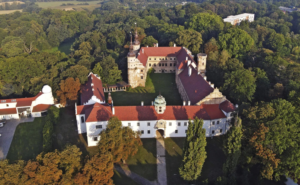On Saturday, several powerful Arab nations rejected U.S. President Donald Trump’s suggestion to relocate Palestinians from Gaza to neighboring Egypt and Jordan. Egypt, Jordan, Saudi Arabia, the United Arab Emirates, Qatar, the Palestinian Authority, and the Arab League all issued a joint statement opposing any plans to displace Palestinians from Gaza and the occupied West Bank. Trump had proposed the idea last month, suggesting he would ask the leaders of Jordan and Egypt to take in Gaza’s largely displaced population. He mentioned that resettling Gaza’s 2.3 million residents could be a temporary or long-term measure, claiming that much of Gaza had been devastated by the ongoing war with Hamas. Some Israeli officials had also discussed the possibility of transferring the population earlier in the conflict. Trump described Gaza as “literally a demolition site,” referring to the extensive destruction caused by the 15-month war, which is currently paused due to a fragile ceasefire.
The Arab nations issued a statement warning that Trump’s proposal to relocate Palestinians would “threaten the region’s stability, risk expanding the conflict, and undermine prospects for peace and coexistence among its peoples.” The statement followed a meeting in Cairo with top diplomats from Egypt, Jordan, Saudi Arabia, the United Arab Emirates, and Qatar, along with Hussein al-Sheikh, a senior Palestinian official who acts as the main liaison with Israel, and Arab League Secretary-General Ahmed Aboul Gheit.
The Arab nations expressed their willingness to work with the Trump administration to “achieve a just and comprehensive peace in the Middle East, based on the two-state solution,” according to their statement. They also urged the international community to assist in developing and implementing a comprehensive reconstruction plan for Gaza to ensure that Palestinians remain on their land.
In a news conference last week, Egyptian President Abdel Fattah el-Sissi firmly rejected Trump’s proposal, stating that the transfer of Palestinians “can’t ever be tolerated or allowed.” Egyptian President Abdel Fattah el-Sissi reaffirmed that the solution to the conflict is the two-state solution, emphasizing the establishment of a Palestinian state. He stated, “The solution is not to remove the Palestinian people from their place. No.” Jordan’s Foreign Minister Ayman Safadi also made it clear that Jordan’s opposition to Trump’s proposal was “firm and unwavering.”
El-Sissi’s office confirmed that the Egyptian leader had a phone call with Trump on Saturday. While the call was described as “positive,” it did not mention Trump’s suggestion. El-Sissi highlighted the need for a “permanent peace” in the region, stressing that the international community looks to President Trump to help broker a historic peace agreement in the Middle East, according to the Egyptian readout.
Both Egypt and Jordan, along with the Palestinians, are concerned that Israel would not allow Palestinians to return to Gaza once they leave. Additionally, Egypt and Jordan fear the potential economic strain and political instability that could result from an influx of refugees. Jordan already hosts over 2 million Palestinians, and Egypt has raised concerns about the security risks of relocating large numbers of Palestinians to its Sinai Peninsula, which borders Gaza.
Both Egypt and Jordan were the first Arab countries to establish peace with Israel, but they continue to support the creation of a Palestinian state in the occupied West Bank, Gaza, and East Jerusalem—territories Israel captured in the 1967 Middle East War.
The Arab nations also stressed the crucial and irreplaceable role of the United Nations Relief and Works Agency (UNRWA) in providing aid to Palestinian refugees. They strongly rejected any attempts to reduce or bypass the agency’s role in supporting these refugees, as stated in their joint statement.
On Thursday, Israel officially banned UNRWA following months of criticism from Prime Minister Benjamin Netanyahu and his far-right allies, who accuse the agency of being infiltrated by Hamas. UNRWA has denied these claims.
UNRWA provides vital assistance to around 2.5 million Palestinian refugees in Gaza, the occupied West Bank, and East Jerusalem, as well as 3 million more in Syria, Jordan, and Lebanon. Since the outbreak of the Israel-Hamas war in October 2023, it has been a critical lifeline for Palestinians in Gaza.













